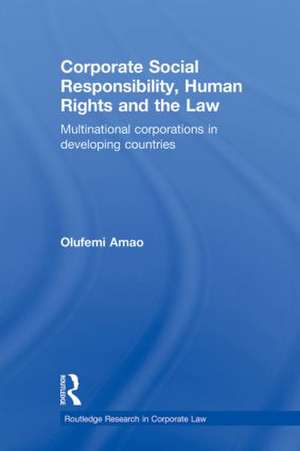Corporate Social Responsibility, Human Rights and the Law: Multinational Corporations in Developing Countries: Routledge Research in Corporate Law
Autor Olufemi Amaoen Limba Engleză Paperback – 12 apr 2013
The book discusses the current trend by MNCs to self regulate by employing voluntary corporate social responsibility (CSR) strategy. Olufemi Amao argues that the CSR concept is insufficient to deal with externalities emanating from MNCs’ operations, including human rights violations. Amao maintains that for CSR to be effective, the law must engage with the concept. In particular, he examines how the law can be employed to achieve this goal. While noting that the control of MNCs involves regulation at the international level, it is argued that more emphasis needs to be placed on possibilities at home, in States and host States where there are stronger bases for the control of corporations.
This book will be useful to academic scholars, students, policy makers in developing countries, UN, UN Agencies, the African Union and its agencies, the European Union and its agencies and other international policy makers.
| Toate formatele și edițiile | Preț | Express |
|---|---|---|
| Paperback (1) | 462.69 lei 6-8 săpt. | |
| Taylor & Francis – 12 apr 2013 | 462.69 lei 6-8 săpt. | |
| Hardback (1) | 1066.09 lei 6-8 săpt. | |
| Taylor & Francis – 4 mai 2011 | 1066.09 lei 6-8 săpt. |
Din seria Routledge Research in Corporate Law
- 9%
 Preț: 934.94 lei
Preț: 934.94 lei -
 Preț: 324.77 lei
Preț: 324.77 lei - 9%
 Preț: 936.55 lei
Preț: 936.55 lei - 18%
 Preț: 1000.27 lei
Preț: 1000.27 lei -
 Preț: 416.22 lei
Preț: 416.22 lei -
 Preț: 449.41 lei
Preț: 449.41 lei - 17%
 Preț: 247.40 lei
Preț: 247.40 lei - 17%
 Preț: 259.98 lei
Preț: 259.98 lei - 12%
 Preț: 312.43 lei
Preț: 312.43 lei - 18%
 Preț: 1005.80 lei
Preț: 1005.80 lei -
 Preț: 382.54 lei
Preț: 382.54 lei - 12%
 Preț: 299.45 lei
Preț: 299.45 lei -
 Preț: 281.63 lei
Preț: 281.63 lei - 18%
 Preț: 1000.27 lei
Preț: 1000.27 lei - 18%
 Preț: 272.43 lei
Preț: 272.43 lei -
 Preț: 407.78 lei
Preț: 407.78 lei -
 Preț: 387.38 lei
Preț: 387.38 lei -
 Preț: 373.59 lei
Preț: 373.59 lei - 18%
 Preț: 1003.12 lei
Preț: 1003.12 lei -
 Preț: 486.42 lei
Preț: 486.42 lei -
 Preț: 448.28 lei
Preț: 448.28 lei -
 Preț: 415.67 lei
Preț: 415.67 lei - 18%
 Preț: 1000.27 lei
Preț: 1000.27 lei -
 Preț: 425.86 lei
Preț: 425.86 lei - 18%
 Preț: 1168.40 lei
Preț: 1168.40 lei - 18%
 Preț: 1000.27 lei
Preț: 1000.27 lei -
 Preț: 389.38 lei
Preț: 389.38 lei -
 Preț: 389.38 lei
Preț: 389.38 lei - 17%
 Preț: 259.98 lei
Preț: 259.98 lei - 18%
 Preț: 897.07 lei
Preț: 897.07 lei - 18%
 Preț: 1058.38 lei
Preț: 1058.38 lei
Preț: 462.69 lei
Preț vechi: 544.34 lei
-15% Nou
Puncte Express: 694
Preț estimativ în valută:
88.53€ • 92.69$ • 73.26£
88.53€ • 92.69$ • 73.26£
Carte tipărită la comandă
Livrare economică 05-19 aprilie
Preluare comenzi: 021 569.72.76
Specificații
ISBN-13: 9780415859257
ISBN-10: 0415859255
Pagini: 336
Ilustrații: black & white illustrations
Dimensiuni: 156 x 234 x 18 mm
Greutate: 0.5 kg
Ediția:1
Editura: Taylor & Francis
Colecția Routledge
Seria Routledge Research in Corporate Law
Locul publicării:Oxford, United Kingdom
ISBN-10: 0415859255
Pagini: 336
Ilustrații: black & white illustrations
Dimensiuni: 156 x 234 x 18 mm
Greutate: 0.5 kg
Ediția:1
Editura: Taylor & Francis
Colecția Routledge
Seria Routledge Research in Corporate Law
Locul publicării:Oxford, United Kingdom
Public țintă
Postgraduate and UndergraduateCuprins
Introduction 1. Multinational Corporations, States and International Regulation: Historical Background 2. Major Attempts at the International Level to Control Multinational Corporations 3. Corporate Social Responsibility and its Relationship to Law 4. Legal and Institutional Framework and the Control of Multinationals in Developing Countries with a focus on Nigeria 5. Regional Human Rights System and Multinational Corporations: The Case of the African Regional Human Rights System 6.The European Union and Corporate Responsibility in Vulnerable States 7. Judicial Process as a Means of Promoting Corporate Responsibility Abroad: Extraterritoriality 8. The Foundation for a Global Company Law for Multinational Corporations: The Complimentary Role at the International Level. Conclusions
Recenzii
"Amao offers a thorough, grounded analysis, beginning with discussion of historical background. He looks at major attempts at the international level to control multinational corporations, the legal and institutional framework for control of multinationals in developing countries (with a focus on Nigeria), the African regional human rights system, the European Union and corporate responsibility, judicial process as a means of promoting corporate responsibility, and the foundation for a global company law."—Book News
Descriere
This book considers the legal control of multinational corporations (MNCs) for violations of human rights from a developing country’s perspective, examining the role for corporate social responsibility (CSR) in regulating the conduct of MNCs. The book uses the case study of Nigeria which is host to major MNCs from the EU and the US, to show that the CSR concept is currently insufficient to deal with externalities emanating from MNCs‘ operations including human rights violations. The book goes on to argue that whilst control of MNCs involves regulation at the international level, more emphasis needs to be placed on possibilities at home States and host States where there are stronger bases for the control of corporations. It examines possibilities in the European Union, exploring ways in which the EU can ensure that MNCs from its territory do not violate human rights when operating abroad.















